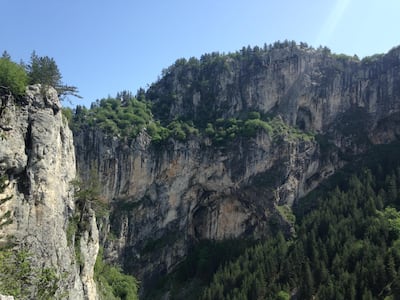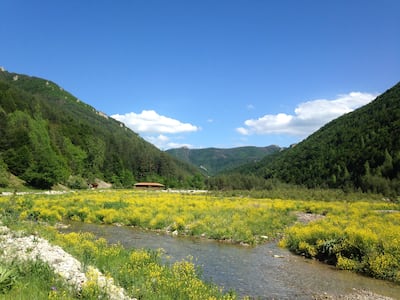The Orpheus flower, Haberlea rhodopensis, grows only in Bulgaria's Rhodope Mountains. The delicacy of its white-and-violet petals belies its remarkable hardiness: it can survive for years in a dried state, needing only the addition of water to return to life. So explains our guide, Mitko, on the second day of our group hiking trip in southern Bulgaria. Appropriately the flower we are looking at, one of fewer than 20 plants endemic to the Rhodopes, is growing out of a rock face by the very cave that inspired the legend of Orpheus.
The Rhodope Mountains rise along the southern flank of Bulgaria and extend across the border into Greece. While not as high as Bulgaria's Rila and Pirin ranges – this is a landscape of limestone gorges, forests and alpine meadows – the highest peak in the Rhodopes still reaches 2,191 metres. Their northern edge is 10 kilometres from Plovdiv, Bulgaria's second-largest city and a European Capital of Culture for 2019, making this ancient settlement a great base for exploring the mountains.
For my four-day trip, I join a group of university students from the United Kingdom, aiming to cover between 15km and 25km a day. There is an extensive network of hiking trails in the Rhodopes, but they are not as well-signed as in, say, the Alps, so unless you're a confident navigator, it's best to take a guide – in this case, Mitko, a cheerful figure who previously worked as a hunter.
June and July are one of the best times to visit the Rhodopes, Mitko explains as we leave Plovdiv by bus, because this is when the alpine meadows are at their finest. While August can be hot in the lower areas, September sees the first frosts, and in October, the beech forests are ablaze with autumn colours. "Every year we get more visitors," Mitko adds.
We start our hike in Yagodina Gorge, near the Greek border. From here, we climb through pine forest to the village of Yagodina, where we leave our packs in our guesthouse and continue on to the nearby mountain of St Ilya. At the summit, a metal platform suspended 500 metres above the gorge offers spectacular views of the Rilas and Pirins. We descend back to the village in the dusk, past wild lilac bushes and carpets of thyme, aiming for the minaret of the village mosque, luminous under the full moon. Mosques are a common sight because the Rhodopes are home to a large Muslim population.
Our guesthouse in Yagodina is typical of our accommodation for the next few days. It is basic but comfortable, with a woodburner in each bedroom: even in June, the nights are cold here, 1,200 metres above sea level. There are hotels for those who prefer more luxury, but the guesthouses offer traditional Rhodopean hospitality and delicious local food. English is not widely spoken, making a guide invaluable, although my high school Russian also comes in handy.
After a hearty bowl of local yoghurt the next morning – rich, tangy and topped with honey and walnuts – we follow a rocky trail to the Trigrad Gorge, a deep cleft of limestone that holds one of the Rhodopes' most famous attractions, the Devil's Throat Cave. This is the source of the Orpheus legend, which tells of his descent into Hades in search of his love, Eurydice. The real Orpheus was born in a nearby village, Mitko explains: he was a Thracian king, part of a civilisation who inhabited south-eastern Europe in Classical times.
Our guide pauses as we descend the modern entrance to Hades – a metal ladder bolted into the rock. "Can you hear that?" he asks. We listen intently. "It is the sound of the underground." The students in our group stifle giggles, then break into an acappella of the Girls Aloud song, much to Mitko's confusion. They are soon drowned out by the throbbing roar coming from the 40-metre-high waterfall that plunges into the cavern, filling the vast chamber with plumes of mist. The Trigrad River disappears into a crack in the rock and re-emerges 530 metres down the valley. What happens in between remains a mystery, one so tantalising that in 1970, two divers attempted to follow its course and were never seen again. Looking down at the narrow fissure they crawled into, we all agree that it's a mystery best left unsolved.
We return to the world of the living in need of lunch. The local restaurant serves up freshly grilled trout, bowls of fresh salad sprinkled with sheep's cheese and an unctious Bulgarian take on the Swiss rösti. The restaurant owner is in the mood for celebrating. He has just become a grandfather, Mitko explains. Duly fortified, we sling on our packs and climb out of the gorge to reach meadows carpeted in purple orchids and the white starbursts of edelweiss.
As we follow the path through the dazzling fields, Mitko crouches down and points to a footprint in a soft patch of earth. "Wolf," he says, "from last night." The Rhodopes are home not just to wolves but also about 180 brown bears, as well as eagles, vultures and a turkey-like bird, the capercaillie. We exchange theories on how best to deal with an angry bear, before Mitko interjects: "You don't need to do anything. Bulgarian bears are scared of humans. It's best if they hear you coming, so if I'm alone, I sing or whistle to warn them off." It seems the local bears are going to be treated to my singing, because the next day I plan to split from the group and traverse the Perelik ridge alone, an option offered to more-experienced hikers.
After a breakfast of Bulgarian donuts, warm from the fryer and slathered with homemade blueberry jam, I wave goodbye to the group and set off for the ridge, which connects two of the highest peaks in the Rhodopes. The morning is warm and cloudless, and I pause for a drink at one of the many natural springs before starting the ascent. But the gods, Thracian or otherwise, have a surprise in store: clouds gather ominously as I climb higher, and within minutes a huge thunderstorm hits the mountain, forcing me to beat a hasty retreat. There is a silver lining to this, because I now have time to visit the historical village of Shiroka Laka, famous for its magnificent timber-frame houses and its tradition of folk music: many of Bulgaria's greatest bagpipe players come from here.
Bagpipe music, softer in tone than the Scottish version, is playing in the cafe where I have breakfast the next morning, on the last day of my trip. A group of women from the village are setting the world to rights over cups of heart-racingly strong coffee, one sipping it through a pink plastic straw. The stooped host from my guesthouse hurries over and in a torrent of Russian and Bulgarian apologises for not being able to offer me breakfast at home. She urges me to come back to the village again: "You're always welcome with us." She needn't have worried: I doubt this will be my last visit.



